
Journal Menu
► ▼ Journal Menu-
- Nanomaterials Home
- Aims & Scope
- Editorial Board
- Reviewer Board
- Topical Advisory Panel
- Instructions for Authors
- Special Issues
- Topics
- Sections & Collections
- Article Processing Charge
- Indexing & Archiving
- Editor’s Choice Articles
- Most Cited & Viewed
- Journal Statistics
- Journal History
- Journal Awards
- Society Collaborations
- Conferences
- Editorial Office
Journal Browser
► ▼ Journal BrowserNeed Help?
Announcements
5 June 2024
Dr. Jihua Chen Appointed Associate Editor of Section “Synthesis, Interfaces and Nanostructures” in Nanomaterials

Name: Dr. Jihua Chen
Email: chenj1@ornl.gov
Home page: https://www.ornl.gov/staff-profile/jihua-chen
Affiliation: The Center for Nanophase Materials Sciences, Oak Ridge National Laboratory, Oak Ridge, United States
Research Interests: Soft Matter Microscopy, Soft Electronics and Ionics, AI for Healthcare and Manufacturing
Dr. Jihua Chen has been a member of the research staff at the Center for Nanophase Materials Sciences at Oak Ridge National Laboratory since 2011. He obtained a Ph.D. in macromolecular science and engineering from the University of Michigan at Ann Arbor, USA, in 2006. He has served on various committees and symposiums for Microscopy and Microanalysis, American Chemical Society, American Physical Society, and Materials Research Society. He is an author or co-author of 170 publications, with an h-index of 58 and over 11k citations on Google Scholar. His research interests include soft electronics and ionics, polymers and organic molecules for energy and medicine and AI for manufacturing and healthcare.
The following is a short Q&A with Dr. Jihua Chen, who shared his vision for the journal with us, as well as his views of the research area and open access publishing:
1. What appealed to you about the journal that made you want to take on the role of its Associate Editor?
Nanomaterials is a cutting-edge open access journal promoting nanoscience and nanomaterial applications. The broader impacts can extend into areas such as optoelectronics, energy storage and harvest, physics, chemistry, biology, medicine, engineering and circular economy, as well as the various approaches that mankind may rely on to tackle technical and societal challenges in the future. I am delighted to be part of this cause.
2. What is your vision for the Section?
Sustainability and efficiency, in my opinion, are among our top priorities in nanoscience, and in the Section “Synthesis, Interfaces and Nanostructures”. The mission of many nanoscience researchers is to achieve sustainability and efficiency in energy and medical applications.
3. What does the future of this field of research look like?
Artificial intelligence (AI) is slowly taking on traditional ways of thinking and operating, including the way that our research is performed. It may not be able to completely replace or fully automate our experiments and analysis any time soon, but personalized AI or customizable AI (tailored for each domain or research area) can greatly increase the productivity of our nanomaterial research toward a future with sustainable energy and efficient healthcare.
4. What do you think of the development of open access in the publishing field?
Open access is an important part of the current and future knowledge-sharing activities including peer-reviewed publications. Personally, I felt the great benefits of being part of the movement. I very much enjoy sharing and receiving knowledge (and wisdom) through open access publications.
We warmly welcome Dr. Jihua Chen as the new Associate Editor and we look forward to him leading Nanomaterials to many more milestones.
4 June 2024
MDPI Insights: The CEO's Letter #12 - First Term as CEO, Tu Youyou Award, Books Report

Welcome to the MDPI Insights: The CEO's Letter.
In these monthly letters, I will showcase two key aspects of our work at MDPI: our commitment to empowering researchers and our determination to facilitating open scientific exchange.
Opening Thoughts

Renewed Term as CEO of MDPI
I released the first CEO Letter at the end of June 2023, reflecting on my first month as CEO. Looking back at the first release, I’m pleased to see a marked consistency of content – from talking about open access (OA) and highlighting the great work being done at MDPI, to bringing together the science community with our conferences and building relations with our editorial board members and our industry as a whole.
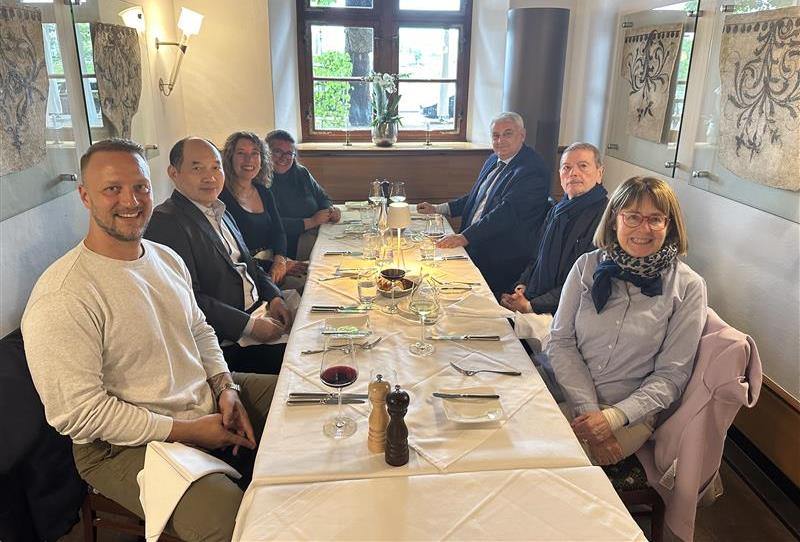
For example, in the first letter, I highlighted our meeting with Dr. Eric O. Freed, the founding and current Editor-in-Chief (EiC) of our journal Viruses. Meeting with Eric is a pleasure, as he has a strong commitment and clear vision for the journal.
On 21 May, 2024 we met with EiC Prof. Dr. Antonino Carbone, and Section EiC Prof. Dr. Alberto Signore (pictured on the left), of our journal Hemato (tracked for Impact Factor, and indexed in Scopus), showing our continued and active collaboration with our chief editors to develop the visions for the journal. Over the course of the day, we gathered feedback and gained an understanding of the journal's expectations and focus on strategic growth.
Reflections on my first year as CEO: achievements and initiatives
During my first year as CEO, there have been many remarkable moments, including a strong focus on bringing people together, focusing on company communications and performance.
According to a recent study of 3,400 people across 10 countries, “Managers impact employees’ mental health (69%) more than doctors (51%) or therapists (41%) — and even the same as a partner (69%).” This is an important topic for me, and perhaps that’s why I place a high value on management culture due to its tangible impact on people’s lives.
When I joined MDPI, I created a weekly meet-up for the Corporate Marketing department and their team leads. On the final Thursday of every month, we hold a Global Marketing meet-up to present projects, share knowledge, and conduct training. For years, I’ve maintained the tradition of ending each of our monthly global calls with a group photo to boost morale, motivation, and productivity, and to finish on a positive note.
In keeping with this, when I stepped into the role of CEO, I launched a bi-weekly management meeting, chairing over 20 MDPI Management Team meetings in my first year. These sessions provide an opportunity for managers to present their team’s work, focusing on their achievements and the challenges they face, while at the same time creating space for sharing knowledge.
“I firmly believe that OA is the future of publishing”
I co-organized and co-led the 2023 MDPI Strategy Management meeting this past October, from which we established an Executive Task Force that meets monthly to prioritize projects aimed at building MDPI into the world’s most trusted publisher. To achieve our goals, we as managers need to maintain collaborative communication and connect to the bigger picture.
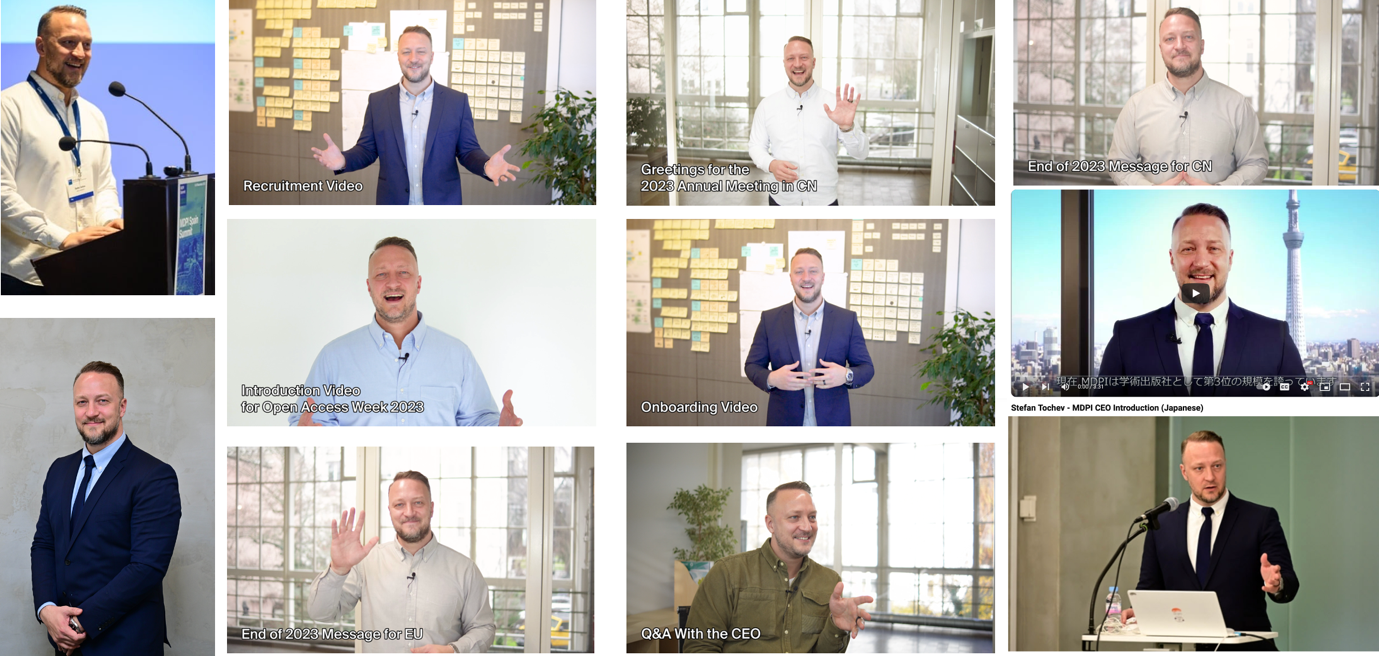
As CEO, I focused on leadership communication by publishing 12 CEO Letters, one for each month of my tenure, to share more about MDPI news and achievements. I also produced ten videos to help further communicate our message.
I was happy to attend eight publishing and conference events, including STM in Frankfurt and Washington, APE, and R2R, and facilitate critical company meetings with Elsevier, Web of Science, ResearchGate, DOAJ, and others. It was a pleasure to meet and have discussions with key organizations and governing bodies such as CAS in China and ANVUR in Italy.
The best part was the opportunity to visit seven MDPI offices across Europe and Asia-Pacific, meeting with local managers and colleagues and supporting them in person. As part of this, I conducted training sessions while continuing to lead the Corporate Marketing department.
Looking ahead
My goal for my second year as CEO is to continue building on the initiatives from the past, including leadership communications, public relations, educational marketing, and company culture, while representing MDPI to the best of my ability. Additionally, I have a few new projects I hope to launch that I believe will be valuable to MDPI and the industry at large.
I firmly believe that OA is the future of publishing, and I am grateful to be in a position to advocate for this belief as part of MDPI, the world's leading open access publisher.
Thank you to our staff and industry friends for your genuine support in this role.
Impactful Research

Nominations Open for the Prestigious Tu Youyou Award 2024
I am pleased to share that MDPI has opened nominations for the 2024 Tu Youyou Award, a prestigious recognition established in honour of Professor Tu Youyou, Nobel Laureate, whose work has significantly transformed the global fight against malaria.
The Tu Youyou Award offers CHF 100,000
In 2015, Professor Tu Youyou was awarded the Nobel Prize in Physiology or Medicine for her discovery of artemisinin, significantly reducing mortality rates from malaria and shaping global health policies. Artemisinin-based combination therapies (ACTs) are now the standard treatment endorsed by the World Health Organization (WHO), saving countless lives, especially in regions heavily burdened by malaria.
MDPI Special Issue
To mark Professor Tu’s 80th birthday in 2009, MDPI’s journal Molecules issued a Special Issue focusing on her contributions to medical research. Recognizing her continuous contribution, MDPI created the Tu Youyou Award in 2016 to honour outstanding achievements in natural products and medicinal chemistry.
The deadline for nominations is 31 December 2024
Nominations are open to scientists excelling in natural products and medicinal chemistry. Eligible nominators include academic institutes, universities, and societies. The deadline for nominations is 31 December 2024, with the winners to be announced on 30 April 2025. The Tu Youyou Award offers CHF 100,000, split equally among the winners.
MDPI encourages the academic community to nominate individuals who have demonstrated excellence and innovation in line with Professor Tu’s legacy. This award not only honours individual achievement but also encourages further scientific exploration and discovery in critical areas of medicine.
This award embodies our deep commitment to groundbreaking research that drives societal progress and celebrates the legacy of one of the greatest medical innovators of our time.
Inside MDPI

2023 MDPI Books Report
In past CEO letters, I have highlighted our publishing process and the impactful peer-reviewed articles that represent the core output of scholarly publishing. However, scholarly books are another pillar of publishing that MDPI also services, which our core audience may not be fully aware of. In this section, I highlight the 2023 MDPI Books report, released by our MDPI Books team in May 2024.
Download the 2023 MDPI Books Report
In the report, you will find a summary of MDPI Books’ 10th anniversary, the books indexed in the Web of Science Book Citation Index, our market outreach, and our outlook for 2024.
MDPI Books celebrated its 10th anniversary in 2023
MDPI Books published its first OA Reprint, “From the Renaissance to the Modern World,” in 2013. Over the past ten years, MDPI Books has seen a significant increase in both the volume and nature of published Reprints. As of December 2023, our catalogue includes a total of 7,369 Reprints, with 1,811 of them added in 2023 alone. MDPI Books includes monographs, book series, edited books and reprints of special issues and topical collections, among other book types.
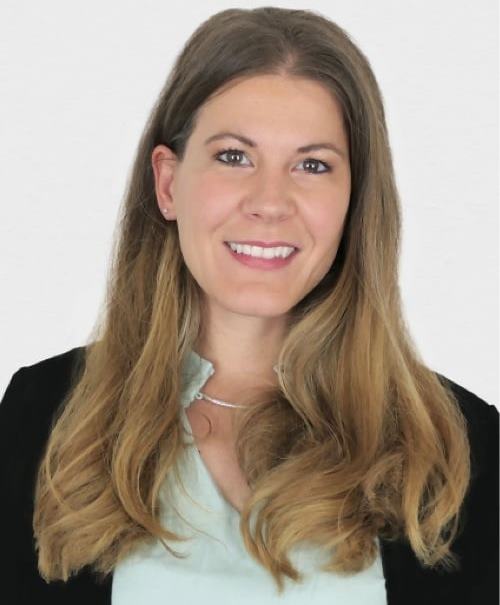
We’re also celebrating the 10-year MDPI anniversary of Laura Wagner, Head of MDPI Books.
Laura Wagner (Head of Books Division)
Laura holds a Bachelor’s degree in Art History and History from the University of Basel. After her studies, she started her career at an art gallery in Basel.
Since joining MDPI in 2014, Laura has held several roles within the company. This included editorial work, development of reprint and book services, and the temporary management of the journal Arts.
Currently Laura holds the role of Head of Books Division and is in charge of the development and strategic direction of MDPI Books.
MDPI Books indexed in Web of Science Book Citation Index
Another milestone in 2023 was the indexing of four book titles in the Web of Science Book Citation Index. The indexing of our open access books is crucial for their reach and accessibility, ensuring higher visibility within the open science community.

- Self-Representation in an Expanded Field: From Self-Portraiture to Selfie, Contemporary Art in the Social Media Age by editor Ace Lehner
- Towards Socially Integrative Cities: Perspectives on Urban Sustainability in Europe and China by editors Bernhard Müller, Jian Liu, Jianming Cai, Paulina Schiappacasse, Hans-Martin Neumann, and Baojun Yang
- Transitioning to Gender Equality by editors Christa Binswanger and Andrea Zimmermann
- Under Construction: Performing Critical Identity by editor Marie-Anne Kohl
If you would like to learn more about MDPI Books, please visit: www.mdpi.com/books
If you are thinking of writing or editing a book, you can submit your proposal at www.mdpi.com/books/publish-with-us, or email us at books@mdpi.com.
Coming Together for Science

Polymers 2024 – Polymers for a Safe and Sustainable Future
Our conference team successfully managed the Polymers 2024 – Polymers for a Safe and Sustainable Future international conference which took place from 28–31 May 2024 in Athens, Greece. The conference was chaired by Prof. Dr. Dimitrios Bikiaris and Prof. Dr. Konstantinos Triantafyllidis from the Aristotle University of Thessaloniki, Greece, and Dr. Ioanna Deligkiozi from AXIA Innovation, Germany. In total, the conference had 259 accepted abstracts and over 300 attendees from 22 different countries.
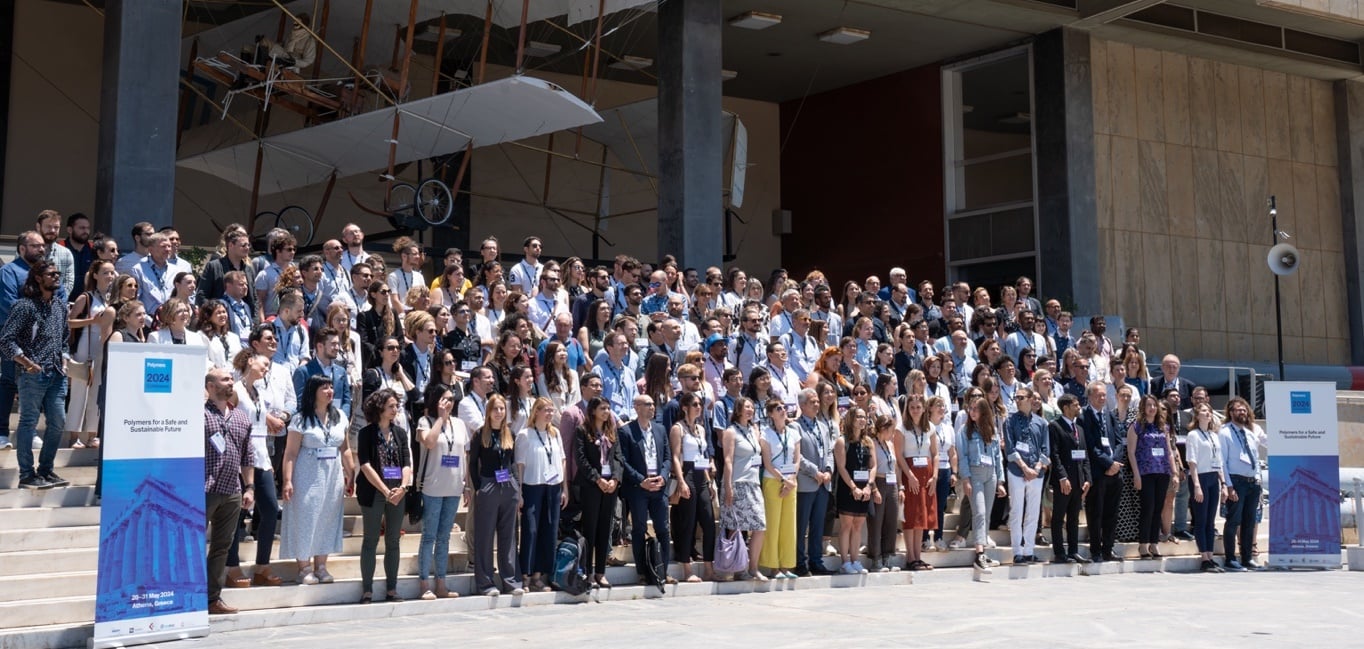
The conference featured three keynote speakers and 12 invited speakers, including esteemed scholars from Europe, Asia, Africa, and Canada. It included 60 selected talks and 189 posters, chosen by the 24 members of the Scientific Committee along with the three Conference Chairs. The event explored the latest scientific advancements and innovations in polymer science, focusing on creating safe, sustainable, and environmentally friendly materials. Emphasizing green polymer chemistry and the use of bioresources, the conference promoted the synthesis of biobased and biodegradable polymers.
The conference featured esteemed scholars from Europe, Asia, Africa, and Canada
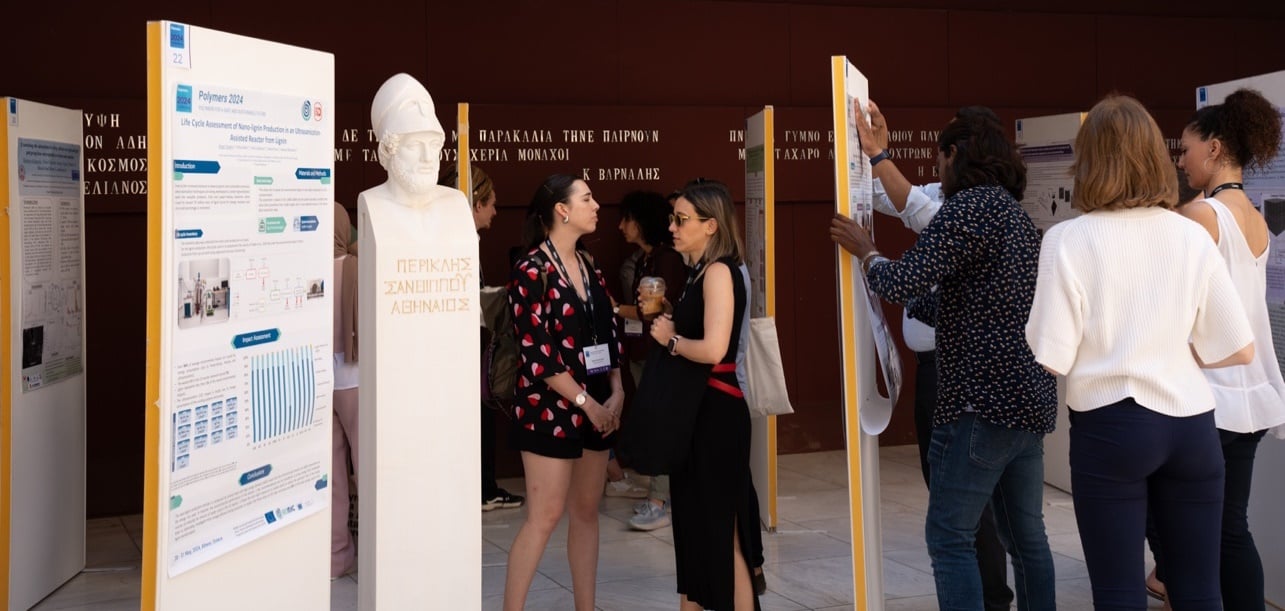
Conference awards
The conference also presented three awards: two sponsored by the journal Polymers – The Best Poster Award (€500) and the Best Oral Presentation Award (€600) – and one sponsored by Ossila, the Best Student Poster Award (€500).
Thank you to our 16 sponsors, three partnering societies (Hellenic Polymer Society, European Polymer Federation, and North American Thermal Analysis Society [NATAS]) and eight media partners.
Upcoming in-person event
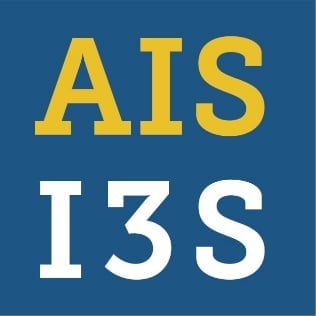
1–4 August, 2024
The 1st International Conference on AI Sensors & The 10th International Symposium on Sensor Science
Location: Singapore
The AI Sensors 2024 Conference will unite innovators and experts in the realms of sensors, sensing technology, and artificial intelligence.
Find more upcoming MDPI events here.
Closing Thoughts
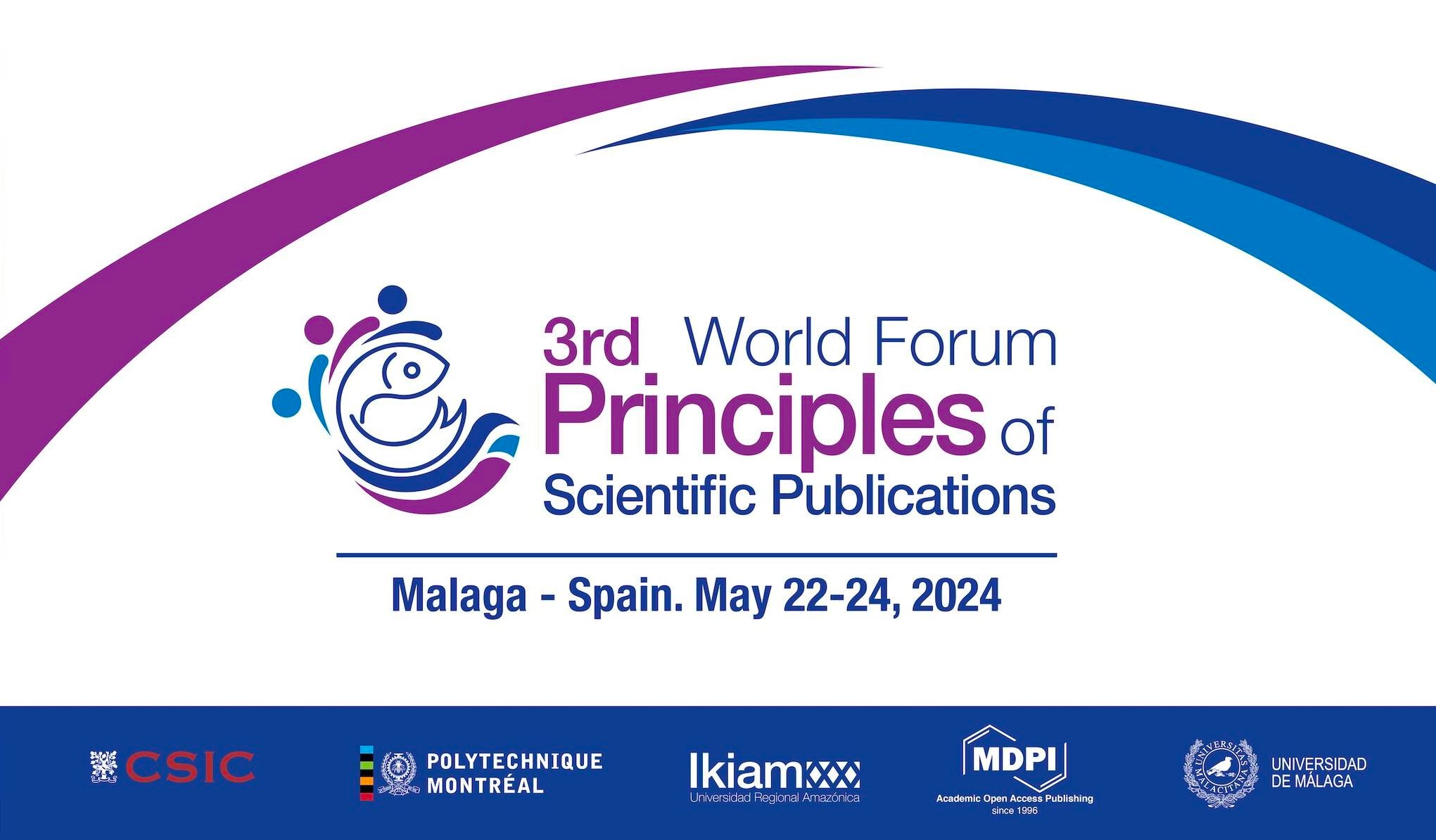
3rd World Forum Principles of Scientific Publications
I’m pleased to share that MDPI sponsored and attended the 3rd World Forum on Principles of Scientific Publications, which took place from 22–24 May in Malaga, Spain. The event brought together academic professionals and leading researchers to discuss critical topics in the realm of publishing and research. Presentation topics included Open Science, AI in Publishing, Predatory Journals, Fake Publications, Challenges for Non-native English Speakers, and more.
“It was great to see strong support from MDPI authors in the audience”
MDPI presentations
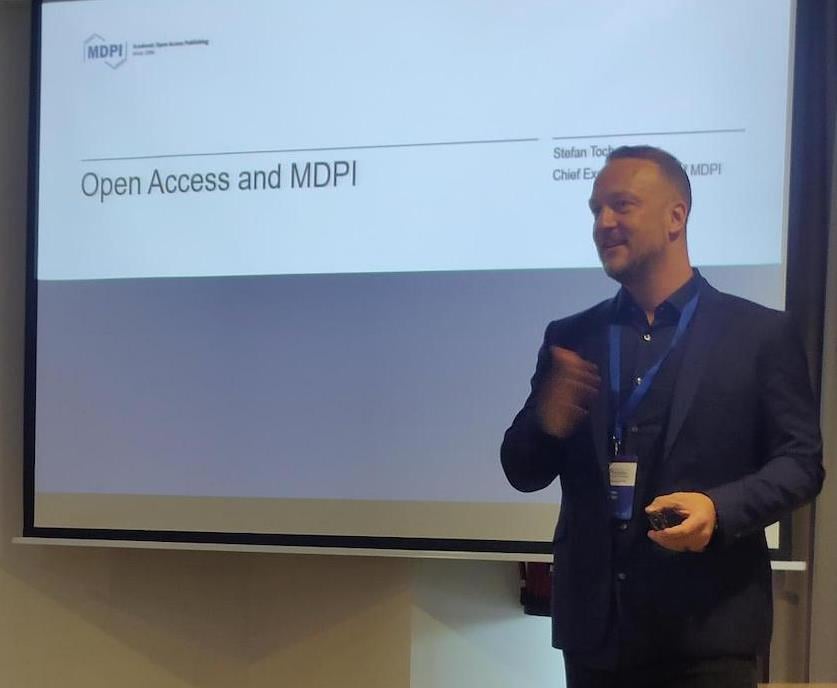
Stefan Tochev (CEO, MDPI) presenting at the 3rd World Forum Principles of Scientific Publications
I had the privilege of attending and presenting at the event, along with my colleague Dr. Enric Sayas (Business Analyst, MDPI) from our Barcelona office, who explored the ethical concerns and opportunities brought by AI in publishing.
I took the opportunity to present on Open Science, the benefits of Open Access, and MDPI’s performance, operations, and investment in ethics. Special thanks to Evan Escamilla (Project Manager, MDPI Books) and Facundo Santomé (Sr. Marketing Manager, MDPI) who also joined the conference.
It was great to see strong support from MDPI authors in the audience who shared their positive experiences publishing with us. Their story reflects the experience of the vast majority of authors who choose to work with MDPI.
We also encountered some conservative views on OA, which created an opportunity for open discussion aimed at addressing concerns about OA and MDPI. Engaging in such discussions is important, as scepticism sometimes arises from misinformation or from a misunderstanding of who we are and how we operate. When we engage in open and honest discussion, we tend to see people getting a better understanding of MDPI, which helps address any misconceptions they may have had.
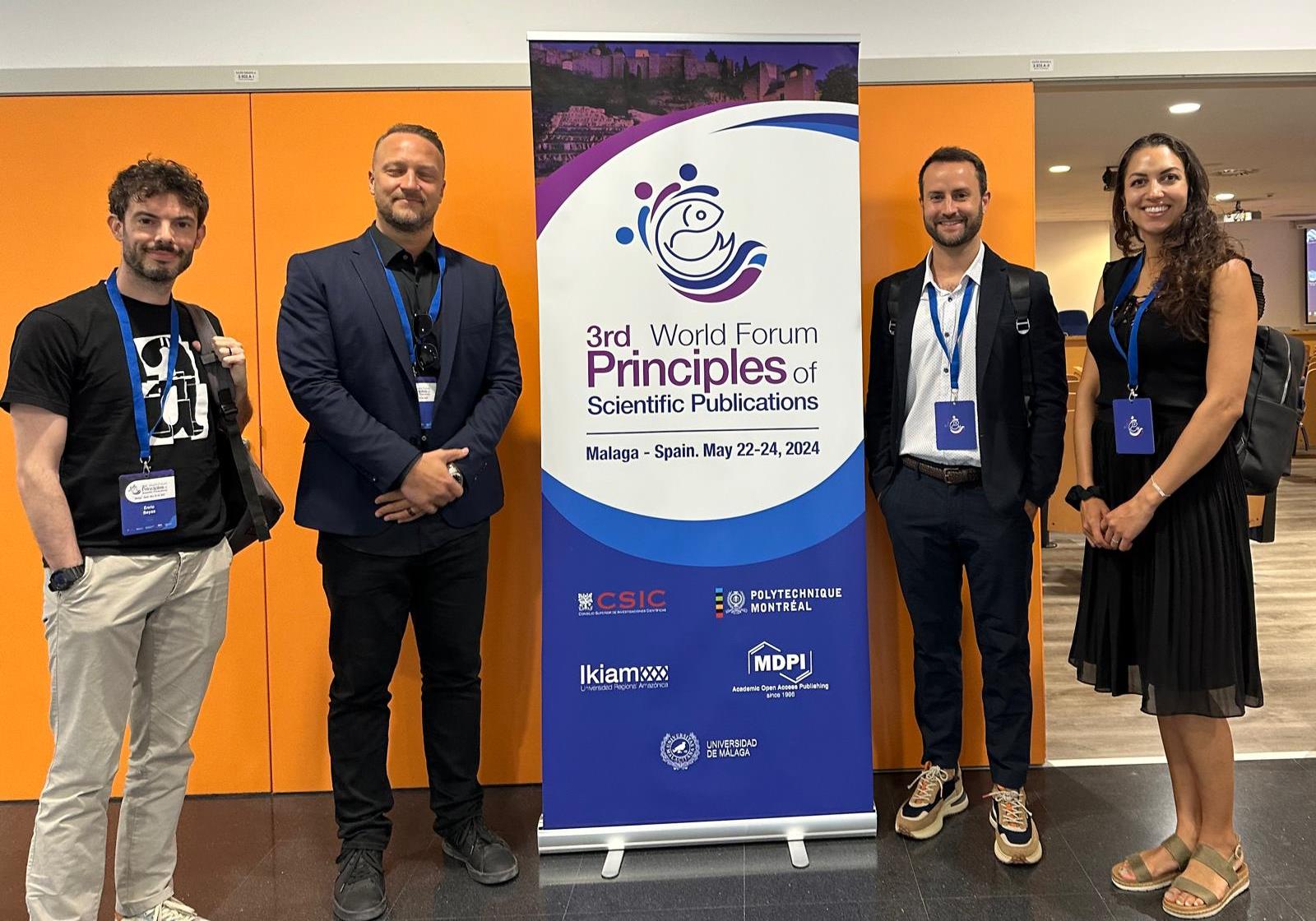
Left to right: Dr. Enric Sayas (Business Analyst, MDPI), Stefan Tochev (CEO, MDPI), Facundo Santomé (Sr. Marketing Manager, MDPI), and Evan Escamilla (Project Manager, MDPI Books) at 3rd World Forum Principles of Scientific Publications
Chief Executive Officer
MDPI AG
3 June 2024
Meet Us at the 50th World Polymer Congress, 1–4 July 2024, Coventry, UK

The 50th World Polymer Congress will be held from 1 to 4 July 2024 in Coventry, UK. The conference is being organized by the University of Warwick.
The areas of focus for the above conference include the following:
- Bio-based polymer chemistry;
- European polymer journals;
- Polymers at surfaces and interfaces;
- Polymers for data science;
- Dynamic polymer networks;
- Block copolymers and self-assembly;
- Functional and sustainable polymers & elastomers.
The following MDPI journals will be represented at the conference:
- Materials;
- Polymers;
- Molecules;
- Membranes;
- Gels;
- Nanomaterials.
If you are planning to attend the above conference, please feel free to start an online conversation with us. Our delegates look forward to meeting you and answering any questions that you may have. Our booth number is awaiting confirmation and will be updated as soon as possible. For more information about the conference, please visit the following link: https://www.macro2024.org/.
23 May 2024
Transfer Service in MDPI
We are pleased to announce MDPI’s Transfer Service.
This service provides a convenient method of transferring your manuscript file, along with any reviewer comments, to another journal within our publishing portfolio.
We are committed to helping authors find the right home for their research, and we will provide authors with guidance and technical support through all stages of the transfer process. Authors will be able to choose to transfer in the following two situations:
1. Select alternative journals on submission.
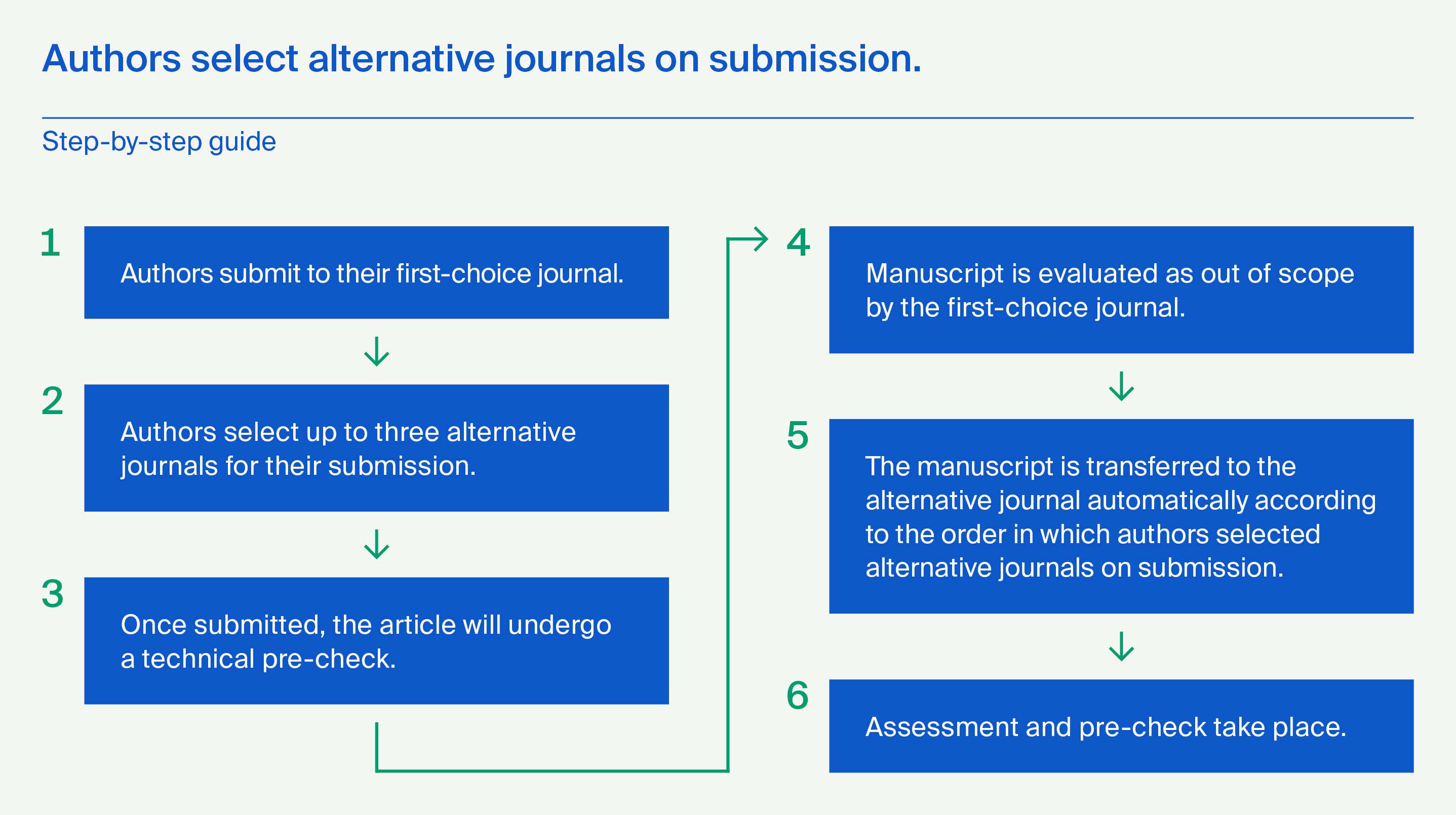
2. Authors are encouraged to transfer manuscripts to other MDPI journals.
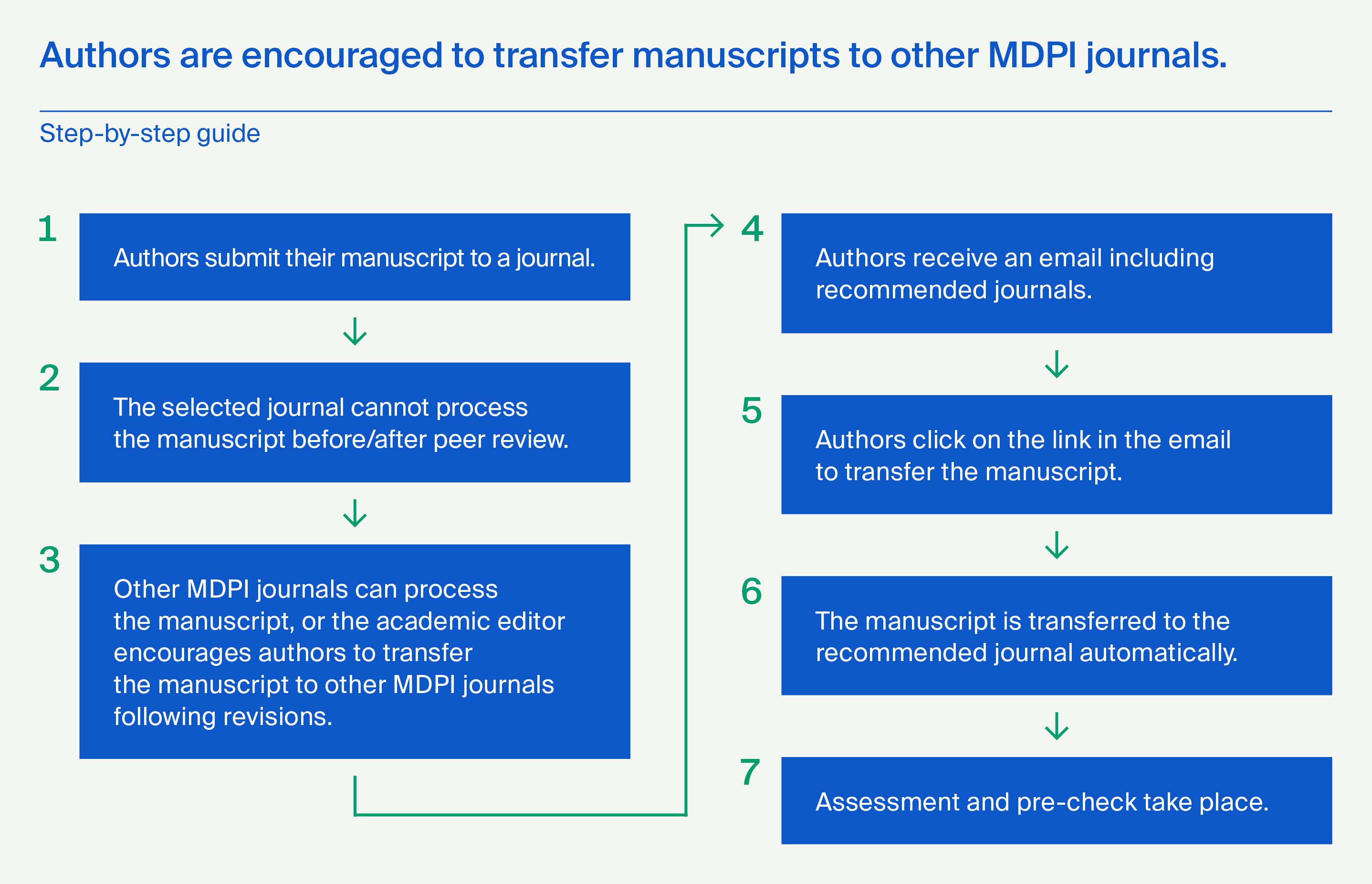
More details about the Transfer Service can be found at the following link:
21 May 2024
Dr. Li Cao Appointed Section Editor-in-Chief of Section “Nanocomposite Materials” in Nanomaterials
We are pleased to announce that Dr. Li Cao has been appointed Editor-in-Chief of the Section “Nanocomposite Materials” in Nanomaterials (ISSN: 2079-4991).
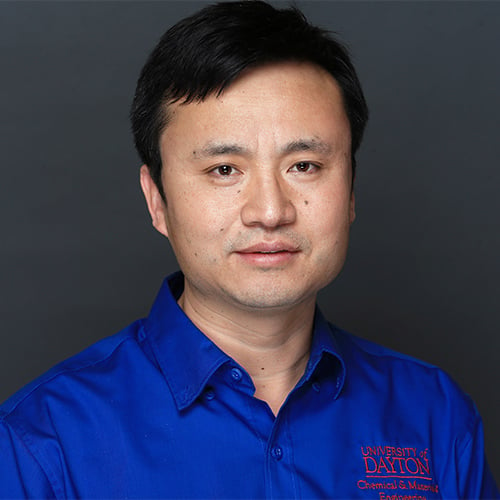
Name: Dr. Li Cao
Affiliation: School of Engineering: Department of Chemical and Materials Engineering, Dayton, Ohio, USA
Interests: The synthesis, characterization, and application of nanomaterials and nanocomposites; development of advanced nanocomposites using 3D printing technologies
Website: https://udayton.edu/directory/engineering/chemical_and_materials/cao-li.php
The following is a short Q&A with Dr. Li Cao, who shared his vision for the journal with us, as well as his views of the research area and open access publishing:
1. What do you think of the development of open access in the publishing field?
In the current world, many people still face difficulties in easily accessing scientific resources to advance their knowledge, techniques, and research. Open access is a great approach as it can provide equal opportunities for everyone to freely access scientific information and knowledge. There is no doubt that open access plays an important role in the advancement of science.
2. What appealed to you about the journal that made you want to take on the role as its Section Editor-in-Chief of “Nanocomposite Materials”?
I have worked on nanomaterial- and composite-related research for many years. Serving as the Section Editor-in-Chief will allow me to make significant contributions to the “Nanocomposite Materials” Section.
3. What is your vision for this Section?
Our Section broadly covers various topics related to the research and applications of nanocomposite materials. It has become a significant platform for researchers and scientists to share their innovative research in this field. It will become a high-impact literature resource for everyone to read the latest developments in nanocomposite materials and applications.
4. What does the future of this field of research look like?
The future of this field of research is very promising due to the rapid development of nanocomposite materials for various applications. Benefiting from the development of technologies and timely dissemination of scientific information, scientists and researchers will continue making innovative progress in nanocomposite materials for diverse applications compared to the past.
We wish Dr. Li Cao every success in his new position, and we look forward to his contributions to the journal.
17 May 2024
Tu Youyou Award—Open for Nominations
In acknowledgment of the groundbreaking achievements of Professor Tu Youyou, the Nobel laureate credited with the discovery of artemisinin, MDPI is proud to announce the Tu Youyou Award. This award, inaugurated in 2016, seeks to honor scholars who excel in the fields of natural products chemistry and medicinal chemistry.
Prize:
- CHF 100,000 in total (If there is more than one winner, the prize will be divided equally amongst the winners);
- An award medal for each winner.
Who should be nominated?
- Scientists with outstanding achievements and contributions in the fields of natural products chemistry and medicinal chemistry.
Who can submit a nomination?
- Academic research institutes
- Universities
- Academic societies
Any personal nominations are not accepted.
How do I submit a nomination?
Candidates’ institutional affiliations need to submit their nominations for final candidates to the Tu Youyou Award Team directly by email after internal screening, and each institution can only nominate a maximum of two candidates for each edition of the Tu Youyou Award. Please note that the nominations cannot be modified once they are submitted and confirmed by the Tu Youyou Award Team.
Required nomination materials:
Nomination Form (Download)
Schedule:
Nomination deadline: 31 December 2024;
Winner announcement: 30 April 2025.
Contact:
Tu Youyou Award Team (tuyouyouaward@mdpi.com)
More information can be found on the Tu Youyou Award official website. For any inquiries, do not hesitate to contact the Tu Youyou Award Team.
16 May 2024
MDPI Romania Author Training Academic Events in April
MDPI Romania sponsored four events over the month of April, contributing author training sessions to each event.
The NutriSciLabs 2024 conference was held at the Carol Davila University of Medicine and Pharmacy on 12 April 2024. Organized by the Association of Students from the Faculty of Pharmacy Studies, the conference aimed to enhance students’ academic writing and research skills, and bolster their confidence in participating in the academic world. Ioana Paunescu, journal relations specialist for MDPI Romania, led the training session. Paunescu first outlined MDPI’s history and core values, then explained academic writing techniques, ethics, and similarity percentages. The presentation covered the entire editorial process, highlighting the amount of attention paid to details throughout manuscript processing. Paunescu also discussed common errors that authors make while writing, and how to avoid such errors.
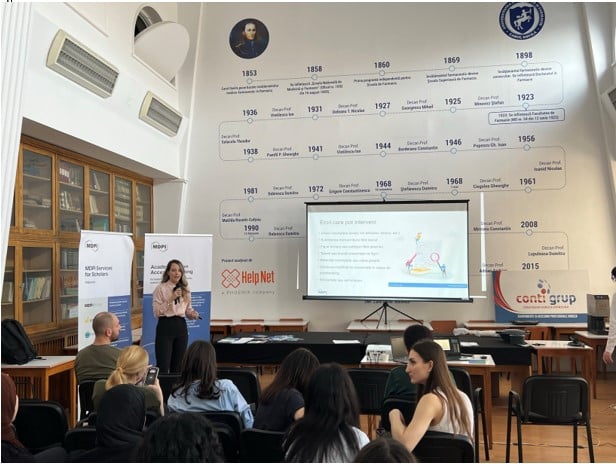
On 13 April 2024, the NextGEN 2.0 Student Conference took place at the Babes-Bolyai University of Cluj-Napoca. NextGen Healthcare organized this event with the university’s European Students’ Society to discuss European and international current affairs. MDPI Romania contributed an author training session called Steps of the Publication Process. Irina Codruta Zaharia, journal relations specialist, began the session with a general introduction of MDPI before diving into different article types, different layout formats, possible journals to submit to, the MDPI submission checklist, and the MDPI editorial process. By explaining the fundamentals of writing and publishing academic papers, Zaharia imparted valuable industry knowledge to the curious minds present. Participants were eager to engage with Zaharia in the subsequent Q&A session.
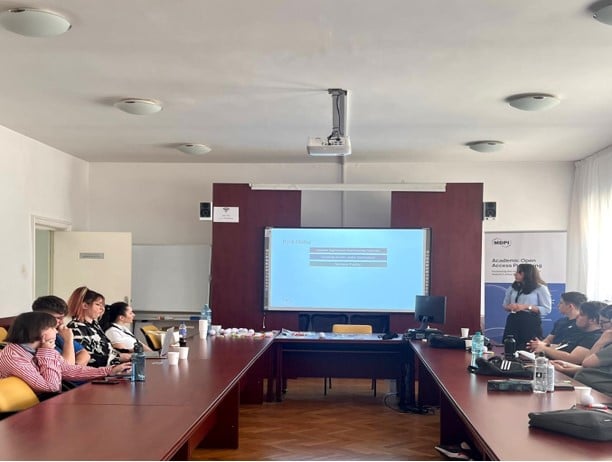
Celebrating its 20th anniversary this year, the International Conference “Students for Students” has long been a gathering place for undergraduate and postgraduate students of all nationalities to present their work and exchange ideas with each other. This year’s conference was held on 18 April 2024, with MDPI Romania contributing an author training session called The World of Open Access. Key speakers included Dr. Norbert Kiss from MDPI Romania and Prof. Dragos Horvath from Strasbourg University. Dr. Kiss discussed the history of open access, differences between open access publishing and traditional publishing, and implications for open access in the future. Attendees expressed keen interest in the subject, approaching Dr. Kiss with questions about academic publishing as well as his career trajectory.
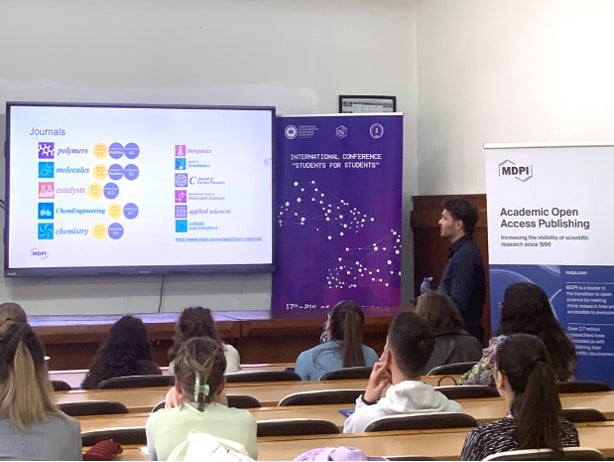
Most recently, on 26 April 2024, MDPI Romania sponsored the National Symposium of Students from Geology and Geophysics Faculties. The AAPG Students Chapter at the Babes-Bolyai University organized this event as an opportunity for geology students from all Romanian universities to present their work and confer with other researchers. Dr. Kiss gave his lecture The World of Open Access at this event as well.
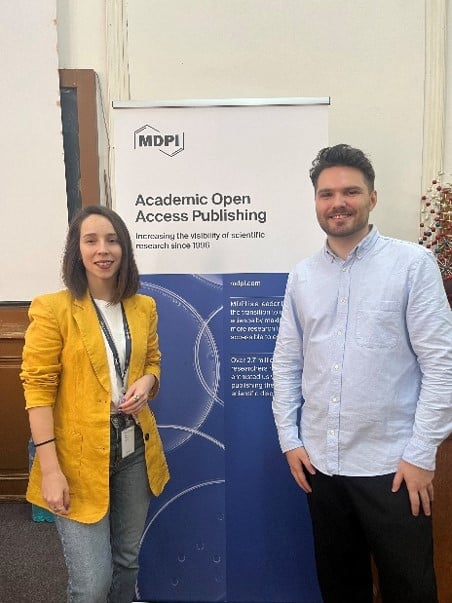
MDPI is thankful to all the participants, speakers, and organizers who attended these events. Through their enthusiasm and dedication, these events were great successes.
14 May 2024
Nanomaterials Webinar | Advances in Nanomaterials for Thermo- and Photocatalysis for Environmental and Energy Applications, 20 May 2024

Of late, the use of nanomaterials has been strongly expanding in most fields of modern life, and as a result, the interest of academic and industrial researchers is constantly growing. In this context, the aim of this webinar is to explore the recent advances in the preparation of nanostructured materials, their characterization, and their use in catalysis, photocatalysis, and hybrid catalytic approaches for a wide range of applications, with a special focus on energy and the environment.
As a part of this webinar, two young but already experienced researchers, one from France and one from Italy, will present their latest research on this modern and trending topic. We look forward to seeing you at this exciting webinar.
Date: 20 May 2024 at 10:00 a.m. CEST | 4:00 p.m. CST Asia
Webinar ID: 860 9124 4575
More information: https://sciforum.net/event/Nanomaterials-17
Register for free:
After registering, you will receive a confirmation email containing information on how to join the webinar. Registrations with academic institutional email addresses will be prioritized.
Unable to attend? Register anyway and we will let you know when the recording is available to watch.
|
Speakers / Presentation |
Time in CEST |
Time in CST Asia |
|
Dr. Leonarda F. Liotta |
10:00–10:10 a.m. |
4:00–4:10 p.m. |
|
Dr. Carmen Ciotonea |
10:10–10:40 a.m. |
4:10–4:40 p.m. |
|
Prof. Salvatore Scirè |
10:40–10:50 a.m. |
4:40–4:50 p.m. |
|
Dr. Roberto Fiorenza |
10:50–11:20 a.m. |
4:50–5:20 p.m. |
|
Q&A Session |
11:20–11:50 a.m. |
5:20–5:50 p.m. |
|
Dr. Leonarda F. Liotta and Prof. Salvatore Scirè |
11:50–11:55 a.m. |
5:50–5:55 p.m. |
Webinar Chairs and Keynote Speakers:
- Leonarda Francesca Liotta, Institute for the Study of Nanostructured Materials (ISMN)-CNR, Palermo, Italy
- Salvatore Scirè, Department of Chemical Sciences, University of Catania, Italy
- Carmen Ciotonea, 1 Unit of Environmental Chemistry and Interactions with Living Organisms” (UCEIV); 2 Engineering School Littoral Opale Coast (EILCO), Dunkerque, France
- Roberto Fiorenza, Department of Chemical Sciences, University of Catania, Italy
Relevant Special Issue:
“Advances in Nanomaterials for Energy Conversion and Environmental Catalysis”
Guest Editors: Jian Qi and Hui Liu
Deadline for manuscript submissions: 20 July 2024
Relevant Topic:
“Porous Materials for Energy and Environment Applications”
Abstract submission deadline: 31 May 2024
Manuscript submission deadline: 31 August 2024
Relevant Section:
10 May 2024
MDPI International Day of Light 2024 Webinar, 16 May 2024
MDPI would like to invite all experts recognized in their fields to attend the MDPI International Day of Light 2024 Webinar, which will be held on 16 May 2024. The aim of this webinar is to encourage researchers to come together, take action, and highlight how the exchange of findings facilitates efforts to raise awareness about the study of light. The study of light has led to promising alternative energy sources, lifesaving medical advances in diagnostics technology and treatments, light-speed internet, and many other discoveries that have revolutionized society and shaped our understanding of the universe.
We are looking forward to seeing you at the MDPI International Day of Light 2024 Webinar.
Title: MDPI International Day of Light 2024 Webinar
Date: 16 May 2024
Time: 09:00 a.m.–11:00 a.m. (CEST) | 03:00 p.m.–05:00 p.m. (CST Asia)
More Information: https://sciforum.net/event/IDL2024
This is a free webinar. After registering, you will receive a confirmation email containing information on how to join the webinar. Registrations with academic institutional email addresses will be prioritized.
Unable to attend? Register anyway and we will let you know when the recording is available to watch.
Register for free:
Program:
|
Speaker/Presentation |
Time in CEST |
Time in CST Asia |
|
Introduction |
09:00 a.m.–09:10 a.m. |
03:00 p.m.–03:10 p.m. |
|
Prof. Dr. Alexey Popov Biotissue-Mimicking Phantoms: Enabling Technology in Biophotonics |
09:10 a.m.–09:30 a.m. |
03:10 p.m.–03:30 p.m. |
|
Q&A Session |
09:30 a.m.–09:35 a.m. |
03:30 p.m.–03:35 p.m. |
|
Prof. Dr. Lorenzo Pavesi |
09:35 a.m.–09:55 a.m. |
03:35 p.m.–03:55 p.m. |
|
Q&A Session |
09:55 a.m.–10:00 a.m. |
03:55 p.m.–04:00 p.m. |
|
Prof. Dr. Wolfgang Kautek |
10:00 a.m.–10:20 a.m. |
04:00 p.m.–04:20 p.m. |
|
Q&A Session |
10:20 a.m.–10:25 a.m. |
04:20 p.m.–04:25 p.m. |
|
Dr. Antonio García-Martin |
10:25 a.m.–10:45 a.m. |
04:25 p.m.–04:45 p.m. |
|
Q&A Session |
10:45 a.m.–10:55 a.m. |
04:45 p.m.–04:55 p.m. |
|
Closing of Webinar |
10:55 a.m.–11:00 a.m. |
04:55 p.m.–05:00 p.m. |
Relevant Special Issues:
Nanomaterials
“Light-Matter Interaction in Nano Systems: Fundamentals and Applications”
Guest Editors: Zhengkun Fu, Lianghui Huang and Mengtao Sun
Deadline for manuscript submissions: 15 June 2024
Sensors
“Automotive Visible Light Communications (AutoVLC)”
Guest Editor: Alin-Mihai Cailean
Deadline: 30 June 2024
“Recent Trends and Advances in Laser Spectroscopy and Sensing”
Guest Editor: Violeta Lazic
Deadline: 20 August 2024
“Feature Papers in Optical Sensors 2024”
Guest Editors: Gabriele Bolognini and Yuliya Semenova
Deadline: 31 December 2024
Applied Sciences
“Application of Advanced Lighting Systems in Buildings and Cities”
Guest Editors: Luis Santos and M. Glória Gomes
Deadline for manuscript submissions: 10 June 2024
“Optical Sensors: Applications, Performance and Challenges”
Guest Editors: Yubing Wang, Lijun Wang and Junfeng Song
Deadline for manuscript submissions: 20 September 2024
“Smart Lighting and Visual Safety”
Guest Editors: Yandan Lin and Minchen Wei
Deadline for manuscript submissions: 20 August 2024
“New Trends in Next-Generation Optical Networks”
Guest Editors: Gerardo Antonio Castañón-Avila
Deadline for manuscript submissions: 21 December 2024
“Interdisciplinary Approaches and Applications of Optics & Photonics (AOP2024)”
Guest Editors: Manuel Filipe P. C. M. Costa and Sandra Franco
Deadline for manuscript submissions: 31 December 2024
“Advances in Optics, Photonics and Lasers”
Guest Editors: Aleksej Rodin and Sergey Y. Yurish
Deadline for manuscript submissions: 30 December 2024
“Laser Ultrasonics and Advanced Sensing: Technologies and Applications”
Guest Editor: Chenyin Ni
Deadline for manuscript submissions: 20 December 2024
“Ultrafast and Nonlinear Laser Applications”
Guest Editor: Sergej Orlov
Deadline for manuscript submissions: 20 November 2024
“Diode Lasers: Materials, Devices and Application”
Guest Editors: Jing Yang and Zhenfu Wang
Deadline for manuscript submissions: 31 October 2024
“Nanophotonics and Integrated Photonics”
Guest Editors: Fanfan Lu and Zhiqiang Yang
Deadline for manuscript submissions: 20 October 2024
Optics
“Ultrafast Light-Matter Interaction”
Guest Editor: Daria Popova-Gorelova
Deadline for manuscript submissions: 15 December 2024
Energies
“Advances in Solar Systems and Energy Efficiency”
Guest Editors: Maciej Zajkowski, Adam Idzkowski, Zbigniew Sołjan, and Stanislav Darula
Deadline for manuscript submissions: 19 June 2024
Inventions
“Recent Advances in Visible Light Communication and Optical Wireless Information Systems”
Guest Editor: Jupeng Ding
Deadline for manuscript submissions: 31 May 2024
7 May 2024
Interview with Prof. Dr. Jing Li—Winner of the Nanomaterials 2023 Outstanding Reviewer Award

Name: Prof. Dr. Jing Li
Affiliation: School of Chemistry, Beihang University, China
Research Interests: surface chemistry and functional assembly of two-dimensional materials
The following is an interview with Prof. Dr. Jing Li:
1. Could you give a brief introduction of yourself to the readers?I was born in 1989 and raised in Hubei Province, People's Republic of China. I earned my B.S. degree in chemistry from Wuhan University, People's Republic of China, in 2011. Subsequently, I pursued my Ph.D. at the Institute of Chemistry, Chinese Academy of Sciences, under the guidance of Prof. Li-Jun Wan and Prof. Dong Wang, focusing on the chemical synthesis and functionalization of graphene, and graduated in 2016. Following that, I served as a research fellow with Prof. Jiong Lu at the National University of Singapore from 2016 to 2022, where I concentrated on the solution synthesis and surface analysis of two-dimensional materials. In 2022, I joined the School of Chemistry at Beihang University, People’s Republc of Chine, as a professor. My research interests encompass the surface study and chemical functionalization of low-dimensional materials.
2. What are you currently researching, and why did you choose this research field?I am currently concentrating on synthesizing novel two-dimensional (2D) nanomaterials and exploring their functional integration into advanced electrocatalytic and mechanical composites. 2D nanomaterials, characterized by their atomic-thick crystalline sheets, possess ultrahigh surface areas and atomic-tailorable crystallinity, affording them many engineerable properties in electronics, photonics, and mechanics. Leveraging these attributes, we aim to facilely fabricate functional composites incorporating a minor amount of 2D nanosheets.
3. Have you ever encountered any difficulties conducting research and how did you overcome them?I believe that most researchers encounter various challenges in their daily research endeavors, and I can certainly attest to facing difficulties in my own research pursuits. Chemistry research, like any scientific pursuit, frequently presents a spectrum of unforeseen obstacles, spanning from experimental setbacks to conceptual complexities. Overcoming these hurdles demands resilience, creativity, and, at times, collaboration. Typically, I address such challenges by initially engaging in meticulous troubleshooting and thoroughly analyzing experimental protocols. This may entail repeating experiments, verifying reagent purity, or modifying experimental conditions to identify the root cause of the issue.
4. Which research topics do you think will be of particular interest to the research community in the coming years?I think it could be advanced mechanical and thermal nanocomposites. Two-dimensional (2D) materials and numerous low-dimensional nanomaterials exhibit exceptionally unique thermal and mechanical properties in contrast to their three-dimensional counterparts. The investigation into the mechanical and thermal attributes of 2D materials, encompassing aspects such as strength, flexibility, and thermal conductivity, is pivotal for comprehending their structural integrity and resilience across diverse applications. The pursuit of methodologies aimed at enhancing these properties or customizing materials to achieve specific mechanical and thermal characteristics holds profound significance for practical implementations in flexible electronics, thermal regulation, and nanocomposite materials.
5. We are an open access journal. How do you think open access impacts authors?I believe that open access has many significant impacts on authors, such as heightened accessibility, enriched collaboration opportunities, and amplified citation rates and impact metrics.
6. Which qualities do you think reviewers need?The patience and willingness to accept feedback in a very constructive manner.
7. What do you think are the main criteria that should be taken seriously in the process of reviewing manuscripts?Scientific validity and originality.
8. As the winner of this award, is there something you want to express or someone to thank most?I am profoundly honored and humbled to receive this award. I am immensely grateful to my Ph.D. and postdoctoral mentors for their invaluable scientific mentorship and guidance, which have significantly contributed to the shaping of my scientific techniques, critical thinking abilities, and expertise. Their mentorship not only benefited me greatly, but also empowered me to offer more insightful suggestions to others.





